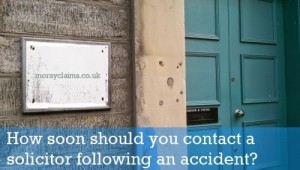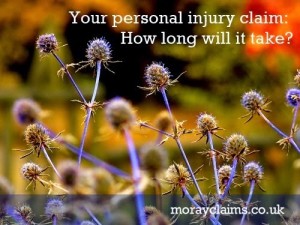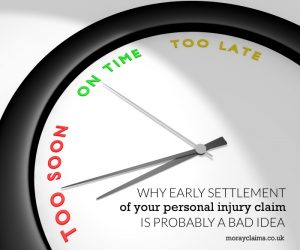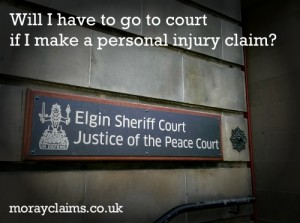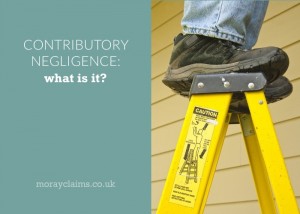Comparing personal injury claim values can have you going round in circles If you have been injured in an accident and want to get an idea how much your claim might be worth, it’s easy to find sources of information on the internet that seem to be helpful. But it can quickly become difficult to reconcile the awards of damages received by different claimants. Often, you find two people with apparently-similar injuries who received very varying levels of compensation. Why is that? Solatium and “special” damages Personal injury claims are valued under two broad headings: solatium and special damages. In Scotland, your claim for the pain and suffering caused by your injuries is known as solatium (in other jurisdictions, it is often known as “general damages”). Special damages, on the other hand, compensate you for financial losses resulting from the accident – typically, wage loss. So, if we compare two women of the same age who each have a broken wrist of similar nature and Continue Reading
FAQs
Below are listed all of our articles covering Frequently-Asked Questions (FAQs) in relation to Personal Injury Claims in Scotland.
Am I Likely To Lose My Job If I Claim For An Injury At Work?
The answer, in a word, is “no” – you are not likely to lose your job if you make a claim. If you have been injured in an accident in the course of your employment due to the fault of your employer, you might be worried that making a personal injury claim could lead to you getting the sack. Quite apart from the stresses and strains caused by your injury itself, the thought that you might lose your livelihood as well can be a strong off-putting factor in relation to making a compensation claim. Your concern might be either that your employment will be terminated as the direct result of making your claim or that the “atmosphere” it will create with your employers will be so bad that it will only be a matter of time before you will feel forced to resign because you will not be able to stand the pressure you are under. What is your employer’s duty to you? Employers have to take all reasonably practicable steps to ensure the safety of their employees at work. This includes Continue Reading
Not Wearing A Seatbelt: How It Can Affect Your Personal Injury Claim
General issues about contributory negligence in PI cases In many personal injury claims, though it’s clear that the accident was the fault of someone else – which means the claim should succeed - there can be arguments about whether you as the injured person should share some of the blame for the accident. This is what is referred to as contributory negligence. It is often possible to counter arguments for contributory negligence, meaning that your claim succeeds in full. It is up to the other side to prove contributory negligence applies in the circumstances rather than being up to you to prove that you did take proper care for your own safety. If contributory negligence applies, your compensation will be reduced. In our experience, across the personal injury accident spectrum, reduction rates most often tend to be in the 10% to 25% range. In other words, for example, if contributory negligence is 25% then you lose one quarter of your damages. Why the level of Continue Reading
Failure to Wear a Cycle Helmet: Can You Still Claim for Injury?
If you are involved in a road traffic accident while riding a bicycle, are you still eligible to make a claim for compensation if the accident was not your fault but you were not wearing a cycle helmet at the time? The answer is very likely ‘yes, you can still claim successfully'. The issue which arises is contributory negligence. No Legal Requirement to Wear a Cycle Helmet Unlike seatbelts in cars, there is no legal obligation to wear a cycle helmet. In theory, this would not prevent a finding of contributory negligence in any event. With seatbelt cases, the introduction of the legal requirement in the 1980s did not affect the various, fixed levels of contributory negligence that had been developed by the courts during the 1970s (and which still apply today). However, there do not seem to be any reported decisions of the courts to date in which a cyclist has had his or her compensation reduced for contributory negligence due to failure to wear a cycle helmet. The English Continue Reading
How soon should you contact a solicitor after an accident?
You should get in touch with a solicitor as soon as possible. If you have been seriously injured, you may not be fit enough to contact a lawyer yourself for months after the accident. In those circumstances, it can be acceptable for a friend or relative to make the first contact. Most solicitors will do home or hospital visits, if that will help get things under way. Or they can get the basic details from the friend or relative, which will allow a start to be made. Ultimately, it will have to be you, the injured person, who gives the instructions to your solicitor but that is not necessarily essential in the first place. It's never too early to call your solicitor ... Years ago, the Law Society of Scotland ran a marketing campaign with the strapline: “It’s never too soon to call your solicitor … but it could be too late.” This may have been dropped because of the appearance of popular alternatives such as “It’s never too soon to call your solicitor … a b*@!*?@!”. Continue Reading
If You Are Injured By An Animal, Can You Make A Claim?
If an animal causes you an injury, can you make a claim for compensation? The modern law of negligence owes a lot to a mollusc but what if you have an accident in Scotland involving an animal – can you claim for your loss or damage? The Cow's Adventure One case from the 1950s involved a clever cow which managed to escape from premises in Inverness’s Eastgate, where it was due to be auctioned. It then managed to climb the stairway of a nearby property and fall through the floor into the shop below. In its struggles it turned on a tap, causing flooding. It also trampled and damaged stock. The Sheriff in that case decided there could be a successful claim against those responsible for the cattle at the time, if they could be shown to have been negligent. Dog Bites In our experience, the most likely injury scenario will involve a person being bitten by an animal, typically a dog. The law here is principally regulated by the Animals (Scotland) Act 1987. Liability Continue Reading
If You Go To Court Will You Get 33 Times More Compensation For Your Personal Injury Claim?
We at Grigor & Young / Moray Claims recently dealt with a personal injury claim for a child who had suffered loss of several teeth following a fall in a local-authority-run play park - caused by a defective ground surface. The best settlement offer received from the insurers in negotiations before court action was raised was £750. Raising a court action resulted in a subsequent negotiated settlement of the claim at £25,000 – in other words, 33 times the best pre-litigation offer. Insurance companies are constantly putting forward the line that personal injury solicitors are simply expensive middle men. The insurers maintain that they can themselves fairly assess the compensation that is due and that, if you choose to deal with them directly, you will not be prejudiced. They will negotiate settlement of the claim with you and your claim will not have to go to court. The insurers say that the benefits of this solicitor-less approach go further. If less money has to be spent on Continue Reading
Your Personal Injury Claim: How Long Will It Take?
It is extremely difficult to say how long a personal injury claim will take but the factors involved are not all within the control of the other party or their insurers, despite what some people think. “I know they will probably try to drag it out for years,” is a comment we often hear from people considering making a compensation claim for injuries suffered in an accident. "They" refers to the person or organisation responsible for paying the compensation that is due – which is usually, but not always, an insurance company. Your personal injury solicitor will constantly be keeping an eye on what is the next step required in relation to your claim. At any given time, your solicitor should be able to give a best estimate of how much longer it will all take. Factors which could have an effect on the length of your claim Some things which will affect how quickly your claim can proceed to a conclusion are: How complex the case is; The severity of your Continue Reading
Can I Choose My Own Personal Injury Solicitor?
The answer is generally “yes”. Please read on for an explanation. In many situations if you have been injured as the result of an accident, you will have other property losses that will be insured and you will be contacting your insurers to claim for those. The most common example is road traffic accidents. Your car may well have been damaged and you will contact your insurers to see about repairs or a replacement vehicle. Your motor insurers will these days usually ask you if you have been injured in the accident. If you have been injured, they will refer you on to a specific law firm as if it is “the normal thing to do”. It is important to be aware that there is a financial relationship between the insurers and the solicitors they recommend to you. The relationship operates on the basis that the insurance company agrees to pass on all their claims to the solicitors and the solicitors pay a referral fee for the privilege. It means that the recommendation is not necessarily Continue Reading
Why early settlement of your personal injury claim is probably a bad idea
If you have been the victim of personal injury due to the fault of another person or organisation, you will be entitled to compensation. Among other things, you will receive damages for the pain and suffering of your injuries and for any financial loss you have incurred, such as wage loss. There is a process you need to go through to get proper compensation. However, we find more and more that insurance companies tell people in your position that this is unnecessary. It is increasingly the case that injured persons are contacted directly by the insurers for the other person or organisation - with an offer to settle their claim there and then. In some cases, this involves a representative of the insurers “door-stepping” the injured person and virtually bullying them into agreeing. It is all too easy to fall into the trap of believing what is implied in the close attention these insurers pay to you: that they have your best interests at heart. Remember that the insurer’s principal Continue Reading
Will I Have To Go To Court If I Make A Personal Injury Claim?
Many people worry that, if they pursue legal action, they will have to endure the stress and hassle of a court hearing (known as a ‘Proof’, in Scotland). We get this question time and again: "Will I have to go to court if I make a personal injury claim?" Solicitors and other legal professionals are more used to the court setting, of course, though it is not stress-free for them either. We understand that the prospect of having to go through court proceedings is daunting, perhaps to the point that it may put you off the idea of making a claim entirely. Most claims settle "out of court" It is important not to get too hung up on the idea that your claim will have to “go to court”. The main reason for this is that, in the vast majority of cases, claims are settled out of court – either because it is never necessary to raise a court action at all or because the claim settles after a court action is raised but before the Proof. The parties on each side of the claim will Continue Reading
Contributory negligence: what is it?
By definition, contributory negligence can only come into play where your claim is going to be successful. The insurance company dealing with the claim will have accepted 'primary' liability and, in doing so, they accept they have to pay you some compensation. However, they want to restrict how much they have to pay to you and contributory negligence is one way they can try to do that. It means they are saying the accident or the injuries you have suffered were partly due to your own fault. This could be because: you did not take proper care when crossing the road and that was part of the reason for you being knocked down; you tripped over something you ought to have seen, if you had been taking reasonable care; you did not wear a hard hat on a construction site and you were more seriously injured than you would have been otherwise when something fell on your head; or as per the photograph at the top of this article, you were injured due to Continue Reading


